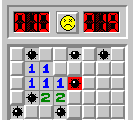
« PREVIOUS ENTRY
Begun, the insane geekfest has
NEXT ENTRY »
Would you like a subpoena with those fries?

A couple of scientists at the University of Utrecht claim that playing computer games at work can actually enhance your job performance. They took 60 employees at a Dutch insurance firm and told half of them they couldn’t play any games at work, ever. They told the other half they could play up to one hour a day of simple computer games like Solitaire or Minesweeper.
The employees kept logs of their feeling about work, and it turned out that the game-players scored higher on job satisfaction. As the BBC reports:
The results suggest that, instead of games being a waste of time at work, they might help personal productivity and make people feel better about their jobs.
A round of Solitaire could be used as a strategy to break up the day and help people work more effectively because it gives their brain a break from complex work tasks.
“I compare games with a coffee break. If you are like me, you use them in strategic, functional, useful way,” Professor Goldstein says.
As someone who regularly warms up for the workday by playing two straight hours of Robotron online (please god I hope no editors are reading this), I am, of course, immeasurably cheered by these findings. It sort of makes common sense that giving employees a way to kick back at work would improve morale, right?
Ah, but here’s the dirty secret of management research: Morale does not necessarily correlate with productivity. Almost no-one will openly admit this fact, though it’s been well supported by many good managerial studies. The sad fact is, plenty of high-performing companies have positively sepulchral atmospheres, with employees who pretty much loathe their cipherlike existences. And vice versa: Plenty of companies with cheery, well-treated employees are careering towards total collapse. I remember plenty of dot-com companies where video games were freely distributed amongst the staff, and everyone had a grand old time at their cubicles … until, of course, their incredibly lame companies folded and pitched them out onto the street. Happy workers don’t necessarily mean high profits, and even the Utrecht scientists noted that “has been little research to show how playing games might positively change employee productivity, job satisfaction or reduce absenteeism.”
This is not to say that bosses ought not to strive to make their employees happy. Indeed, I think that’s just good moral behavior. But it’s a moral choice, not a strategic one.
But here’s one vote in favor of playing games at work. Bill Gates, one of the richest men in the world, is reportedly a major Minesweeper addict who can solve the puzzle in only four seconds.
(Thanks to Slashdot for this one!)
I'm Clive Thompson, the author of Smarter Than You Think: How Technology is Changing Our Minds for the Better (Penguin Press). You can order the book now at Amazon, Barnes and Noble, Powells, Indiebound, or through your local bookstore! I'm also a contributing writer for the New York Times Magazine and a columnist for Wired magazine. Email is here or ping me via the antiquated form of AOL IM (pomeranian99).

ECHO
Erik Weissengruber
Vespaboy
Terri Senft
Tom Igoe
El Rey Del Art
Morgan Noel
Maura Johnston
Cori Eckert
Heather Gold
Andrew Hearst
Chris Allbritton
Bret Dawson
Michele Tepper
Sharyn November
Gail Jaitin
Barnaby Marshall
Frankly, I'd Rather Not
The Shifted Librarian
Ryan Bigge
Nick Denton
Howard Sherman's Nuggets
Serial Deviant
Ellen McDermott
Jeff Liu
Marc Kelsey
Chris Shieh
Iron Monkey
Diversions
Rob Toole
Donut Rock City
Ross Judson
Idle Words
J-Walk Blog
The Antic Muse
Tribblescape
Little Things
Jeff Heer
Abstract Dynamics
Snark Market
Plastic Bag
Sensory Impact
Incoming Signals
MemeFirst
MemoryCard
Majikthise
Ludonauts
Boing Boing
Slashdot
Atrios
Smart Mobs
Plastic
Ludology.org
The Feature
Gizmodo
game girl
Mindjack
Techdirt Wireless News
Corante Gaming blog
Corante Social Software blog
ECHO
SciTech Daily
Arts and Letters Daily
Textually.org
BlogPulse
Robots.net
Alan Reiter's Wireless Data Weblog
Brad DeLong
Viral Marketing Blog
Gameblogs
Slashdot Games